The McAlpine family had great political influence. Sir Alfred McAlpine & Son Limited was the main contractors of the Brookside building site in Telford, which featured prominently in the charges against the pickets. Robert Alistair McAlpine became the Treasurer of the Conservative Party in 1975.
The Home Secretary, Robert Carr instructed the Chief Constable of West Mercia to investigate picketing in the Shrewsbury area during the dispute. Gwynedd police joined the investigations shortly afterwards. Their reports went to the Director of Public Prosecutions in December 1972. Eight weeks later, on the 14 February, 24 pickets were charged with 243 offences between them.
Although all 24 were charged with the offence of intimidation under section 7 of the Conspiracy and Protection of Property Act 1875, just six pickets were to stand trial for the common law offence of ‘conspiracy to intimidate’. At the time the The Guardian asked, “how the ‘Shrewsbury Six’ were chosen from the hundreds of pickets who were instrumental in closing many sites and persuading non-strikers to join the stoppage, not only in Shropshire but throughout the country?” How indeed.
The first Shrewsbury trial involved six of the pickets. They faced a shopping list of charges: Des Warren had 28 charges levelled against him, Eric Tomlinson 21, John McKinsie Jones 12, John Llywarch 9, Ken O’Shea 13 and John Carpenter 9, yet when the trial actually began the Crown proceeded with just 3 charges against them:
- conspiracy to intimidate
- affray
- unlawful assembly
At the end of the trial the remaining charges against each of them were left to lie on the file. They were not withdrawn.
None of the pickets were convicted of assault.
